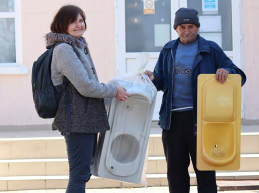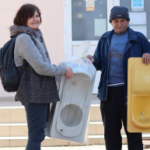
Description of the project: Since 2020, Women in Sustainable Development Moldova implement a climate resilient ecological sanitation model to treat grey and black water in the rural school of “Mihai Eminescu” in Slobozia Mare. Sanitized urine is distributed through an automatic pumping and drip irrigation system to a garden of decorative plants, while the faecal waste is treated via vermicomposting and used as soil fertilizer. This EcoSan model is located in the biosphere nature reserve “Prutul de Jos” in South Moldova. It engages 414 school pupils, teachers and school staff in exemplary water source protecting and climate adaptation activities with a long-lasting positive impact on the degraded ecosystem.




